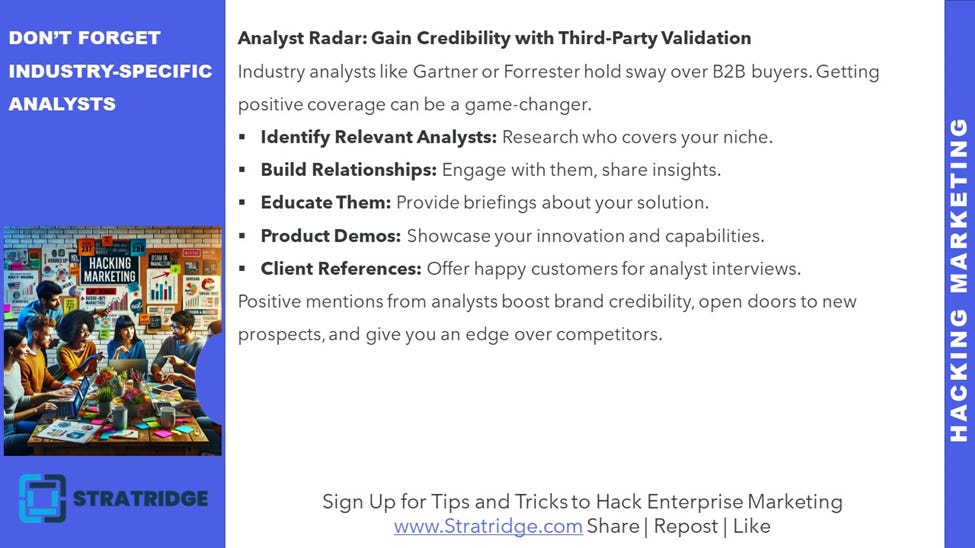In the competitive B2B landscape, credibility and visibility are paramount. Positive engagement with industry analysts is one of the most effective ways to enhance both. Firms like Gartner, Forrester, IDC, and others wield significant influence over market trends and buyer decisions. A nod from these entities can validate your business's offerings, positioning your brand as a leader in your niche.
The Influence of Industry Analysts
Industry analysts conduct in-depth research and provide unbiased evaluations of products, services, and market trends. Their reports, ratings, and recommendations are highly regarded in the B2B world, often guiding the purchase decisions of potential buyers and shaping industry standards. Here's why positive analyst coverage is crucial:
Market Credibility: Analyst endorsements can enhance your market credibility, lending an external, objective validation to your technology or services.
Strategic Visibility: Being featured in an analyst report can increase your visibility among potential customers who rely on these insights to make purchasing decisions.
Competitive Advantage: Positive recognition from analysts can set you apart from competitors, highlighting your unique solutions and innovations.
Strategies for Engaging with Industry Analysts
Identify Relevant Analysts:
Research and Identify: Start by identifying which analysts cover your sector. Look at recent reports, blogs, and media appearances to understand their areas of interest and expertise.
Focus on Relevance: Target analysts whose interests align with your offerings. Their coverage areas should closely match the solutions your business provides.
Build Relationships:
Initial Contact: Use Email or social media to introduce your company. Provide clear, concise information about what you do and why it's relevant to their research.
Consistent Engagement: Regularly engage with analysts by sharing industry insights, company updates, and other relevant information. Keep communications professional and informative.
Educate Them Through Briefings:
Analyst Briefings: Schedule briefings with analysts to educate them about your products, services, and market perspective. These sessions are crucial for analysts to gather information and gauge your industry standing.
Preparation: Prepare meticulously for these briefings. Include data points, customer case studies, and clear explanations of your technology's unique attributes.
Product Demonstrations:
Showcase Innovations: Invite analysts to view product demonstrations virtually or in person. Demonstrations allow analysts to see firsthand your solutions' practical application and benefits.
Highlight Differentiators: Focus on what sets your product apart during these demos. Be clear about how your technology addresses market gaps or customer pain points.
Provide Client References:
Happy Customers: Offer analysts the opportunity to speak with satisfied customers. These references should be well-prepared to discuss how your product has positively impacted their operations.
Diverse Examples: Provide a range of references that showcase how your product works in different environments or scales.
Maximizing the Impact of Analyst Relations
Strategic Follow-Up: After engaging with analysts, follow up with additional information and keep them updated on new developments. This helps keep your brand top-of-mind.
Leverage Analyst Content: Utilize analyst reports and mentions in your marketing materials. Quotes or ratings from respected analysts can be powerful testimonials to include on your website, in sales pitches, or in marketing campaigns.
Feedback Loop: Use the feedback from analysts to improve your products and strategies. Analysts have a broad market view and can provide insights that drive strategic improvements.
Engaging with industry analysts is more than just a marketing strategy; it's a comprehensive approach to building credibility and enhancing visibility in your market. You can gain valuable third-party validation by effectively identifying relevant analysts, building strong relationships, educating them about your products, and showcasing your solutions through demos and customer testimonials. This validation boosts your brand's credibility, opens doors to new prospects, and gives you a competitive edge in your industry. Remember, the goal is to inform analysts about your business and foster ongoing relationships that benefit both parties and support your long-term business objectives.
For more marketing tips, tutorials, templates, and tricks, please subscribe to https://www.stratridge.com


